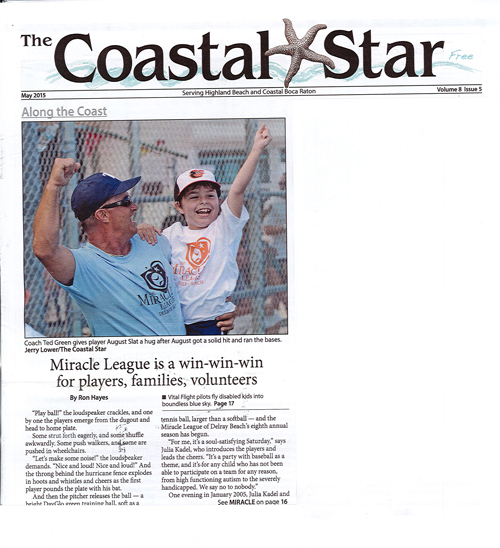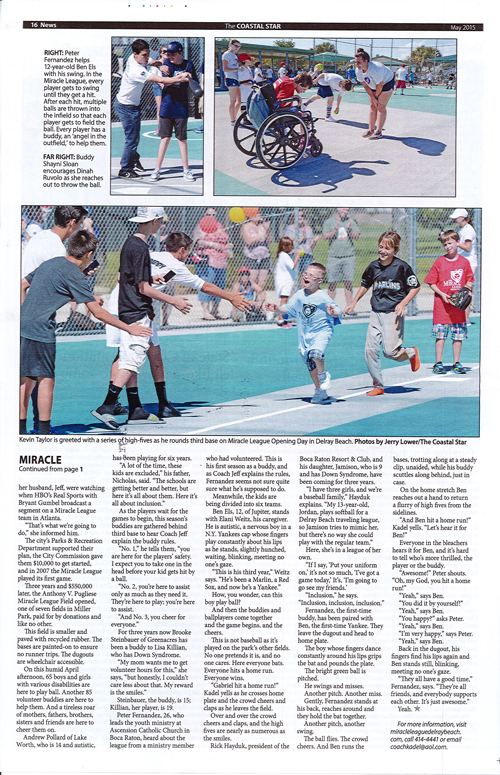By Ron Hayes
“Play ball!” the loudspeaker crackles, and one by one the players emerge from the dugout and head to home plate.
Some strut forth eagerly, and some shuffle awkwardly. Some push walkers, and some are pushed in wheelchairs.
“Let’s make some noise!” the loudspeaker demands. “Nice and loud! Nice and loud!” And the throng behind the hurricane fence explodes in hoots and whistles and cheers as the first player pounds the plate with his bat.
And then the pitcher releases the ball — a bright DayGlo green training ball, soft as a tennis ball, larger than a softball — and the Miracle League of Delray Beach’s eighth annual season has begun.
“For me, it’s a soul-satisfying Saturday,” says Julia Kadel, who introduces the players and leads the cheers. “It’s a party with baseball as a theme, and it’s for any child who has not been able to participate on a team for any reason, from high functioning autism to the severely handicapped. We say no to nobody.”
One evening in January 2005, Julia Kadel and her husband, Jeff, were watching when HBO’s Real Sports with Bryant Gumbel broadcast a segment on a Miracle League team in Atlanta.
“That’s what we’re going to do,” she informed him.
The city’s Parks & Recreation Department supported their plan, the City Commission gave them $10,000 to get started, and in 2007 the Miracle League played its first game.
Three years and $550,000 later, the Anthony V. Pugliese Miracle League Field opened, one of seven fields in Miller Park, paid for by donations and like no other.
This field is smaller and paved with recycled rubber. The bases are painted-on to ensure no runner trips. The dugouts are wheelchair accessible.
On this humid April afternoon, 65 boys and girls with various disabilities are here to play ball. Another 85 volunteer buddies are here to help them. And a tireless roar of mothers, fathers, brothers, sisters and friends are here to cheer them on.
Andrew Pollard of Lake Worth, who is 14 and autistic, has been playing for six years.
“A lot of the time, these kids are excluded,” his father, Nicholas, said. “The schools are getting better and better, but here it’s all about them. Here it’s all about inclusion.”
As the players wait for the games to begin, this season’s buddies are gathered behind third base to hear Coach Jeff explain the buddy rules.
“No. 1,” he tells them, “you are here for the players’ safety. I expect you to take one in the head before your kid gets hit by a ball.
“No. 2, you’re here to assist only as much as they need it. They’re here to play; you’re here to assist.
“And No. 3, you cheer for everyone.”
For three years now Brooke Steinbauer of Greenacres has been a buddy to Lisa Killian, who has Down Syndrome.
“My mom wants me to get volunteer hours for this,” she says, “but honestly, I couldn’t care less about that. My reward is the smiles.”
Steinbauer, the buddy, is 15; Killian, her player, is 19.
Peter Fernandez, 26, who leads the youth ministry at Ascension Catholic Church in Boca Raton, heard about the league from a ministry member who had volunteered. This is his first season as a buddy, and as Coach Jeff explains the rules, Fernandez seems not quite sure what he’s supposed to do.
Meanwhile, the kids are being divided into six teams.
Ben Els, 12, of Jupiter, stands with Elani Weitz, his caregiver. He is autistic, a nervous boy in a N.Y. Yankees cap whose fingers play constantly about his lips as he stands, slightly hunched, waiting, blinking, meeting no one’s gaze.
“This is his third year,” Weitz says. “He’s been a Marlin, a Red Sox, and now he’s a Yankee.”
How, you wonder, can this boy play ball?
And then the buddies and ballplayers come together and the game begins, and the cheers.
This is not baseball as it’s played on the park’s other fields. No one pretends it is, and no one cares. Here everyone bats. Everyone hits a home run. Everyone wins.
“Gabriel hit a home run!” Julia Kadel yells as he crosses home plate and the crowd cheers and claps as he leaves the field.
Over and over the crowd cheers and claps, and the high fives are nearly as numerous as the smiles.
Rick Hayduk, president of the Boca Raton Resort & Club, and his daughter, Jamison, who is 9 and has Down Syndrome, have been coming for three years.
“I have three girls, and we’re a baseball family,” Hayduk explains. “My 13-year-old, Jordan, plays softball for a Delray Beach traveling league, so Jamison tries to mimic her, but there’s no way she could play with the regular team.”
Here, she’s in a league of her own.
“If I say, ‘Put your uniform on,’ it’s not so much, ‘I’ve got a game today,’ It’s, ‘I’m going to go see my friends.’
“Inclusion,” he says. “Inclusion, inclusion, inclusion.”
Fernandez, the first-time buddy, has been paired with Ben, the first-time Yankee. They leave the dugout and head to home plate.
The boy whose fingers dance constantly around his lips grips the bat and pounds the plate.
The bright green ball is pitched.
He swings and misses.
Another pitch. Another miss.
Gently, Fernandez stands at his back, reaches around and they hold the bat together.
Another pitch, another swing.
The ball flies. The crowd cheers. And Ben runs the bases, trotting along at a steady clip, unaided, while his buddy scuttles along behind, just in case.
On the homestretch Ben reaches out a hand to return a flurry of high fives from the sidelines.
“And Ben hit a home run!” Julia Kadel yells. “Let’s hear it for Ben!”
Everyone in the bleachers hears it for Ben, and it’s hard to tell who’s more thrilled, the player or the buddy.
“Awesome!” Peter shouts. “Oh, my God, you hit a home run!”
“Yeah,” says Ben.
“You did it by yourself!”
“Yeah,” says Ben.
“You happy?” asks Peter.
“Yeah,” says Ben.
“I’m very happy,” says Peter.
“Yeah,” says Ben.
Back in the dugout, his fingers find his lips again and Ben stands still, blinking, meeting no one’s gaze.
“They all have a good time,” Fernandez says. “They’re all friends, and everybody supports each other. It’s just awesome.”
Yeah.
Article date: Jun. 04 2015
Article type: General News
Event Location: Delray Beach – Palm Beach County







